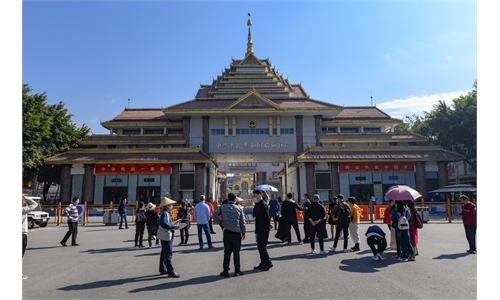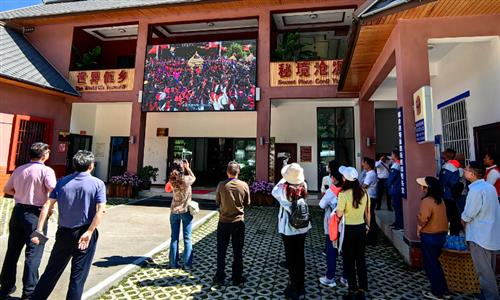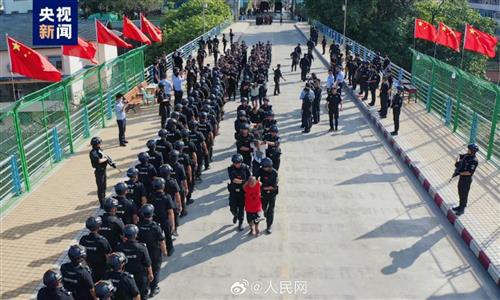China hopes for stability in Myanmar the most, this remains unwavering: Global Times editorial

The photo taken on September 26, 2023 shows the border area between Yinjing village in Ruili, Southwest China's Yunnan Province and Manhlyoe village in Myanmar. Photo: VCG
Chinese State Councilor and Minister of Public Security Wang Xiaohong visited Myanmar, where he held a meeting with Myanmar's Chairman of the State Administration Council Min Aung Hlaing, and co-chaired the seventh China-Myanmar ministerial meeting on law enforcement and security cooperation with Myanmar Union Minister for Home Affairs Lt-Gen Yar Pyae. Wang also met with Myanmar's Union Minister for Immigration and Population U Myint Kyaing.
As this visit involved a senior Chinese official responsible for security, security cooperation was naturally a focal point for both sides. This included deepening cooperation in law enforcement, combating telecommunications fraud, online gambling, counter-terrorism, drug control, law enforcement in the Mekong River region, and security for major projects. This visit reflects a microcosm of China's international security cooperation. For the international community, accurately understanding the significance of these activities will contribute to comprehending China's security perspective, which is of great importance.
Since the beginning of this year, China has consistently increased its efforts to combat cross-border telecommunications fraud and engaged in joint law-enforcement operations with several Southeast Asian countries, achieving remarkable results. However, completely eradicating cross-border telecommunications fraud remains a complex, challenging, and long-term process. Northern Myanmar is a significant hiding place for fraudsters. For a long time, criminals have not only perpetrated false investment and financial scams, online shopping scams, and internet loan fraud against the people of China and various Southeast Asian countries, but have also spawned various illegal activities, including illegal detention, kidnapping, and human trafficking. With the advancement of technology, the methods used for cross-border telecommunications fraud are becoming increasingly covert and cost-effective, causing great distress to the local population and even leading to the destruction of families and loss of lives. The general public has suffered from telecommunications fraud for far too long.
However, due to differences among countries in terms of political systems, levels of social development, and various other factors, achieving cross-border collaboration to effectively combat cunning criminals is not easy. It means that nations need to invest a significant amount of effort, along with unwavering determination and consistent policy support, to possibly eradicate this malignant tumor and remove a major concern from the public. It's not hard to imagine that if a similar situation were to occur in the US or some other Western countries, it would likely turn into a political card for parties to attack each other, leading to a protracted political tug-of-war, while the genuine interests of the people continue to suffer greater harm due to the ongoing delays.
Some Western media outlets, upon seeing Chinese security officials visiting Myanmar, instinctively interpreted the "collaboration" in security from a Western perspective. Some, with ideological glasses, implied that Myanmar is still an "outlier" in the international community and was highly vigilant about China and Myanmar getting closer in security cooperation. Some also linked the visit to the recent conflict in northern Myanmar, portraying China as a powerful force attempting to intervene or even manipulate Myanmar's internal affairs. It must be said that these imaginations are highly Westernized, which reflects the security views in the minds of Western political elites do not accurately reflect the reality on the ground.
Whether it is Chinese officials visiting Myanmar or joint law-enforcement actions with Southeast Asian countries, it is not difficult to see that this is another successful practice of China's vision of common, comprehensive, cooperative and sustainable security. Under the premise of mutual respect and sovereign equality, all parties take coordinated action for the same security goal, and the final results are shared by all the people, and those results can be truly felt by everyone. Now, in addition to Southeast Asian countries, organizations and institutions such as ASEAN and the United Nations have also joined in, and the strength to combat cross-border telecommunications fraud and strive for common security is constantly growing. This fully demonstrates the international appeal and leadership of China's Global Security Initiative.
China-Myanmar pauk-phaw friendship runs deep. Neighbors wish each other well, just as loved ones do to each other. China hopes for Myanmar's swift stability the most and will always maintain the attitude of cooperating and seeking development together with Myanmar. This is not only reflected at the national level but also represents the genuine attitude of Chinese society, as "common security" also enjoys a broad and firm consensus within Chinese society. However, our way of achieving it never involves forcefully interfering in other countries' internal affairs or attempting to transform other countries according to our own wishes. China has never done such things in the past and present, and will not do so in the future. Our choice is to prioritize the well-being of the people, and on the basis of mutual respect, use cooperative and win-win means to eliminate those issues that cause pain to the people. The fight against fraud in Northern Myanmar is a typical example of this.



